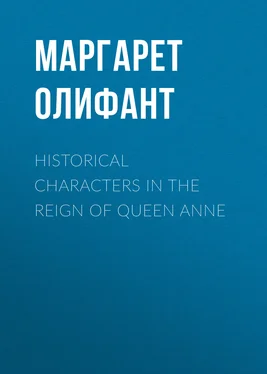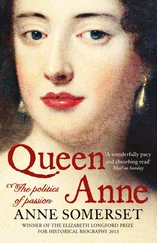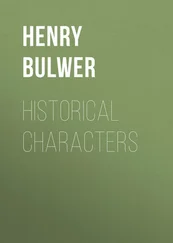Маргарет Олифант - Historical Characters in the Reign of Queen Anne
Здесь есть возможность читать онлайн «Маргарет Олифант - Historical Characters in the Reign of Queen Anne» — ознакомительный отрывок электронной книги совершенно бесплатно, а после прочтения отрывка купить полную версию. В некоторых случаях можно слушать аудио, скачать через торрент в формате fb2 и присутствует краткое содержание. Жанр: foreign_prose, История, foreign_edu, foreign_antique, на английском языке. Описание произведения, (предисловие) а так же отзывы посетителей доступны на портале библиотеки ЛибКат.
- Название:Historical Characters in the Reign of Queen Anne
- Автор:
- Жанр:
- Год:неизвестен
- ISBN:нет данных
- Рейтинг книги:3 / 5. Голосов: 1
-
Избранное:Добавить в избранное
- Отзывы:
-
Ваша оценка:
- 60
- 1
- 2
- 3
- 4
- 5
Historical Characters in the Reign of Queen Anne: краткое содержание, описание и аннотация
Предлагаем к чтению аннотацию, описание, краткое содержание или предисловие (зависит от того, что написал сам автор книги «Historical Characters in the Reign of Queen Anne»). Если вы не нашли необходимую информацию о книге — напишите в комментариях, мы постараемся отыскать её.
Historical Characters in the Reign of Queen Anne — читать онлайн ознакомительный отрывок
Ниже представлен текст книги, разбитый по страницам. Система сохранения места последней прочитанной страницы, позволяет с удобством читать онлайн бесплатно книгу «Historical Characters in the Reign of Queen Anne», без необходимости каждый раз заново искать на чём Вы остановились. Поставьте закладку, и сможете в любой момент перейти на страницу, на которой закончили чтение.
Интервал:
Закладка:
It is half ludicrous, half pathetic, in the midst of all the tumult and confusion of the time, to note the constant allusions to the princess’s condition, which recurs whenever she is mentioned. There were always reasons why it should be especially cruel to disturb her, and her state had constantly to be taken into account. It was very natural in such circumstances that she should more and more cling to her stronger friend, and find no comfort out of her presence. “Whatever changes there are in the world, I hope you will never forsake me, and I shall be happy,” she writes during this period of excitement and distress. She herself was weak and not very wise. In a sudden emergency neither she nor her husband were good for much. They could carry on the routine of life well enough, but when unforeseen necessities came they stood helpless and bewildered; but Lady Churchill was quick of wit and full of inexhaustible resource. To her it was always given to know what to do.
It is unnecessary here to enter into the history of what is called the Great Revolution. It is the great modern turning-point of English history, and no doubt it is one of the reasons why we have been exempted in later days from the agitations of desperate and bloody revolutions which have shaken all neighboring nations. Glorious and happy, however, scarcely seem to be fit words to describe this extraordinary event. A more painful era does not exist in history. There is scarcely an individual in the front of affairs who was not guilty of treachery at one time or another. They betrayed one another on every hand; they were perplexed, uncertain, full of continual alarms. The king who went away was a gloomy bigot; the king who came was a cold and melancholy alien. Enthusiasm there was none, nor even conviction, except of the necessity of doing something of a wide-reaching and undeniable change. The part which the ladies at the Cockpit played brings the hurry and excitement of the movement to its crisis. Both in their way were anxious for their respective husbands, absent in the suite of James, and still in his power. When the report came that Lord Feversham had begged of James “on his knees two hours” to order the arrest of Churchill, Mrs. Freeman must have needed all her courage; while the faithful Morley wept, yet tried to emulate the braver woman, wondering in her excitement what her own heavy prince was doing, and eager for William’s advance, which, somehow or other, was to bring peace and quiet. That heavy prince meanwhile was mooning about with the perplexed and unhappy king, uttering out of his blond mustache with an atrocious accent his dull wonder, “Est il possible?” as every new desertion was announced, till mounting heavily one evening after dinner, warmed and encouraged by a good deal of King James’s wine, and riding through the cold and dark, in his turn he deserted too. When this event happened, the excitement at the Cockpit was overwhelming. The princess was “in a great fright.” “She sent for me,” says Lady Churchill, “told me her distress, and declared that rather than see her father, she would jump out of window.” King James was coming back to London, sad and wroth, and perhaps the rumor that he would have her arrested lent additional terrors to the idea of encountering his angry countenance. Lady Churchill went immediately to Bishop Compton, the princess’s early tutor and confidential adviser, and instant means were taken to secure her flight. That very night, after her attendants were in bed, Anne rose in the dark, and with her beloved Sarah’s arm and support stole down the back stairs to where the bishop, in a hackney coach, was waiting for her. Other princesses in similar situations have owned to a thrill of pleasure in such an adventure. No doubt at least she breathed the freer when she was out of the palace where King James with his dark countenance might have come any day to demand from her an account of her husband’s behavior, or to upbraid her with her own want of affection. Anyhow, the sweep of the current had now reached her tremulous feet, and she had no power any more than stronger persons of resisting it.
Anne’s position was very much changed by the Revolution. If any ambitious hopes had been entertained or plans formed by her household, they were speedily and very completely brought to an end. The dull royal pair with their two brilliant guides and counselors now found themselves confronted by another couple of very different mark: the serious, somewhat gloomy, determined, and self-concentrated Dutchman, and the new queen, Mary, a person far more attractive and imposing than Anne; two people full of character and power. We have no space here, however, to appropriate to these remarkable persons. William, in particular, belongs to larger annals and a history more important than these sketches. Mary has left an epitome of herself in her letters which is among the most wonderful of individual revelations; but this cannot now be our theme, though the subject is a most attractive one.
Two persons so remarkable threw into the shade even Churchill and Sarah, much more good Anne and George. We have no reason to suppose that Mary entertained any particular sentiment whatever toward her sister, from whom she had been entirely separated for the greater part of her life, and the history of their relations is a painful one from beginning to end. No doubt the queen regarded the household of the princess with the contempt which a woman with so entirely different a code would naturally entertain for a family in which the heads were so lax and secondary, the counselors so prominent. There was nothing in Mary which would help her to understand the feeling with which Anne regarded her friend
Mary. She had herself made use of their influence in the time when it was all important to secure every power in England for William’s service, but a proud distaste for the woman whom the princess trusted as her equal soon awoke in the bosom of the queen. The Churchills, however, served the new sovereigns signally by persuading the princess to yield her own rights, and consent to the conjoint reign, and to William’s life sovereignty—no small concession on the part of the next heir, and one which only the passive character of Anne could have made to appear insignificant.
Had she been a stronger and more intellectual woman, this act would have borne the aspect of a magnanimous and noble sacrifice to the good of the country, of her own interests, and that of her children. As it was, her self-renunciation has got her very little credit, either then or now, and it has been considered rather an evidence of the discretion of the Churchills than of the generosity and patriotism of the princess. These, perhaps, are rather large words to use in speaking of Anne, but it must be remembered that a narrow mind is usually not less, but more, tenacious of personal honor and advantage than a great one, and that the dimmer an understanding may be, the less it is accessible to high reason and noble motive. This sacrifice accomplished, however, there commenced a petty war between Whitehall and the Cockpit, in which perhaps Mary and Lady Churchill (now Marlborough) were the chief combatants, but which from henceforward until her sister’s death became the principal feature in Anne’s life. Continued squabbling is never lovely even when it is between queens and princesses, but in this case the injured person has had no little injustice, and the offender so many partizans that it may not be amiss to make Anne’s side of the question a little more apparent.
If her friend was to blame for embroiling Anne with the queen, it can scarcely be believed that the princess’s case would have been more satisfactory had she been left in her helplessness to the tender mercies of William, and entirely dependent upon his kindness, which must have happened had there been no bold and strong adviser in the matter. There was no generosity in the treatment which Anne received from the royal pair. She had made a sacrifice to the security of their throne which deserved some grace in return. But her innocent fancy for the palace at Richmond, where the sisters had been brought up together, was not indulged, nor would there be much excuse even if she were in the wrong for the squabblings about her lodging at Whitehall. But she cannot be said to have been in the wrong in the next question which occurred, which was the settlement of her own income. This she had previously drawn from her father, according to the existing custom in the royal family, and James had been always liberal and kind to her. But it was a different thing to depend upon the somewhat grudging hand of an economical brother-in-law, who had a number of foreign dependents to provide for, and a great deal to do with the money granted to him. He alarmed her friends on this point at once by a remark made to Clarendon as to what the princess could want with so large an income as thirty thousand a year; and he does not seem at any time or in any particular to have shown consideration for her. Perhaps the Churchills were afraid that their mistress would be less able than usual to help and further their own fortunes, as is universally alleged against them; but, had they been the most disinterested couple in the world, it would still have been their duty to do what they could to secure her against any caprice of the new king, who had no right to be the arbiter of her fate. Lady Marlborough’s strenuous action to bring the question to the decision of Parliament was nothing less than her mistress’s interests demanded. And the sense of the country was so far with them that the princess’s income was settled with very little difficulty upon a more liberal basis than her father’s allowance; which, considering that she, and the children of whom she was every year becoming the mother, were the only acknowledged heirs of the throne, was a perfectly natural and just arrangement.
Читать дальшеИнтервал:
Закладка:
Похожие книги на «Historical Characters in the Reign of Queen Anne»
Представляем Вашему вниманию похожие книги на «Historical Characters in the Reign of Queen Anne» списком для выбора. Мы отобрали схожую по названию и смыслу литературу в надежде предоставить читателям больше вариантов отыскать новые, интересные, ещё непрочитанные произведения.
Обсуждение, отзывы о книге «Historical Characters in the Reign of Queen Anne» и просто собственные мнения читателей. Оставьте ваши комментарии, напишите, что Вы думаете о произведении, его смысле или главных героях. Укажите что конкретно понравилось, а что нет, и почему Вы так считаете.












